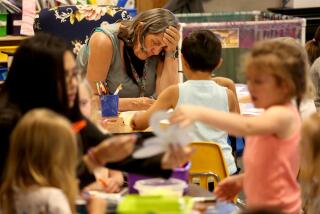Personal Touch Brings Teacher $5,000 Award
- Share via
ANAHEIM — JoAnn Kemp arrives at her Ball Junior High School computer science classroom at 5 a.m. daily to meet the children of parents who must be at work by sunrise.
Her day usually ends after 5 p.m., when she is done working with any child who needs a hand with a lesson, or with her work in a program that has lowered the school’s annual dropout rate from 11.7% to 3.9% in recent years.
For her efforts, Kemp on Wednesday was named a Reader’s Digest American Hero in Education, an annual award given to 15 public- and private-school teachers in the country. Kemp--selected by a panel of educational professionals from 450 nominees nationwide--will receive a personal award of $5,000, which she plans to give to her husband, Donald Kemp, Buena Park’s assistant city manager. In addition, her school will get $10,000, which will be used primarily for computer equipment.
Kemp, who became a teacher in 1983 after 15 years as a programmer and analyst for TRW Inc., says her goal is to make a difference in one child’s life each day. A legally blind, farm-reared native of Michigan, Kemp said she vowed to reach that goal to repay the debt she owes to the teachers who had faith in her.
“I try to find in my classes the kids who are at risk of dropping out, the kids that aren’t going to stay here without some help,” she said. “I make it a point to develop a personal relationship with that child and find out why it is (that) he or she is having problems and then to work with them.”
Kemp’s students say it is easy to see that she wants them to succeed.
“She tries to put herself in each student’s shoes and make them feel that she understands their problems and cares about them,” said Jennifer Lee, 13, an eighth-grader who is one of Kemp’s student assistants. “No matter how hard your problem is, she’ll help you out.”
Kemp’s colleagues agree.
“She puts in an inordinate amount of time and the students know that she wants them to be successful,” said Ball Junior High Principal Douglas Munsey. “She has a great empathy for kids. She’s a neat lady.”
Kemp said she began coming to school before sunrise when she realized that many students were consistently absent because their parents--many of whom are employed as maids, cooks or other workers at the city’s hotels and must get to work at dawn--left early and no one else was home to send them off to school.
“It is almost impossible for a child to come to school when there is no one (home) in the morning to see him off,” she said. “I’m here so the parents who have to work early can drop their child off safely. We do their homework, they go get breakfast when the cafeteria opens, and then they go to class.”
The events that led Kemp to teaching began in the early 1950s, when an algebra teacher noticed that Kemp was having a hard time passing tests that were written on a blackboard.
It turned out that she could barely see the problems and was copying them incorrectly. On a closer look, the teacher noticed that Kemp’s answers to the incorrectly copied problems were right. The teacher responded by driving 15 miles to persuade Kemp’s mother to purchase eyeglasses for her.
“The doctor put the glasses on me and I looked out the window and I could see not only the trees, but the individual leaves,” Kemp said. “I took the glasses off and said: ‘I don’t want these, they are like a telescope.’ But he said I was just seeing normally for the first time. It turns out I’m legally blind.”
After high school, Kemp wasn’t sure she would be able to afford college, but then she received a scholarship that memorialized a Michigan teacher killed in the Korean War. She received a bachelor’s degree in math and a master’s in education from USC before going to work for TRW in 1963.
From 1975 to 1978, Kemp served as a teacher in retraining programs for TRW employees. When the program ended, she realized she wanted to give up her job as a programmer to become a teacher, and went back to school to get a teaching credential.
“My world is supposed to be people, not computers,” she said.
More to Read
Sign up for Essential California
The most important California stories and recommendations in your inbox every morning.
You may occasionally receive promotional content from the Los Angeles Times.













